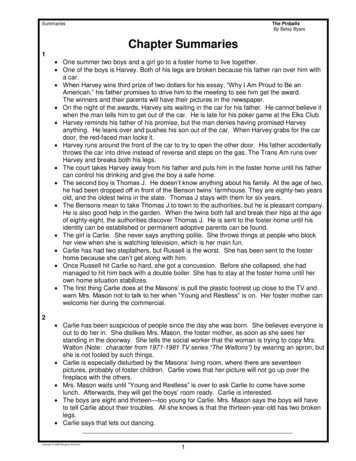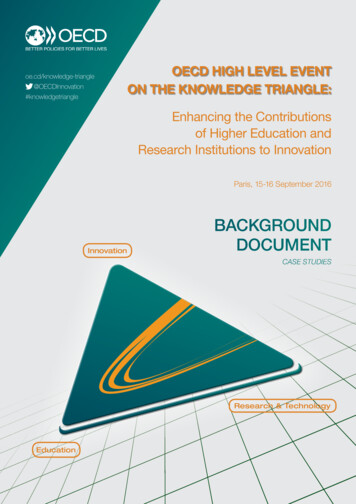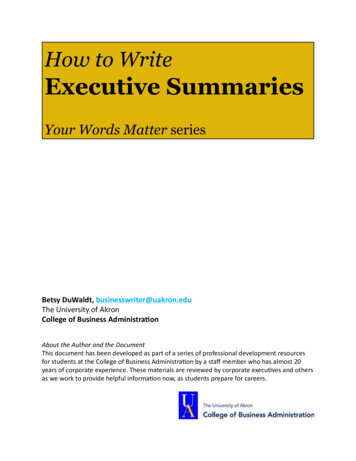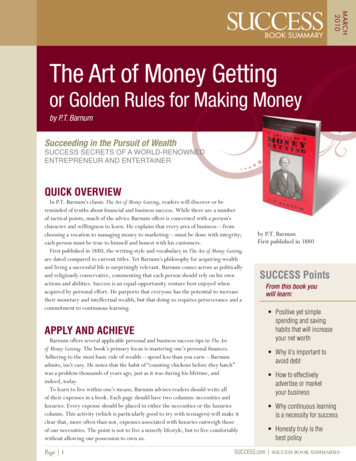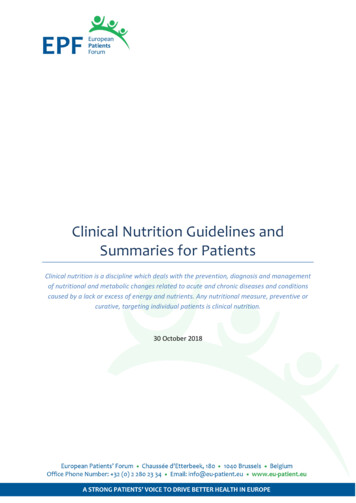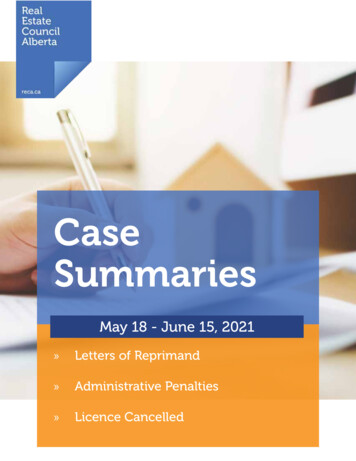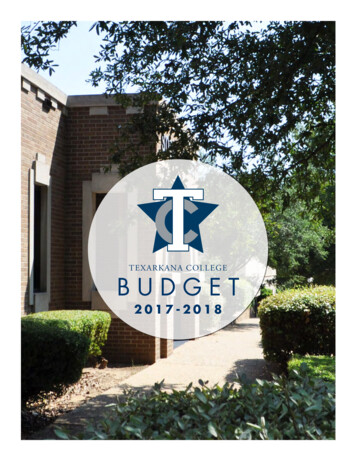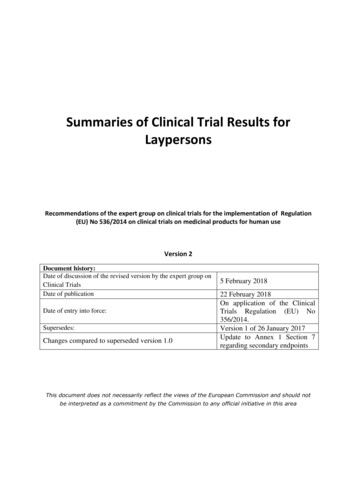
Transcription
Summaries of Successful Federal Habeas Casesin theNinth Circuit Court of Appeals2000 - 2018Anthony BornsteinAssistant Federal Public DefenderDistrict of OregonFor the past several years, law clerks with the Federal Public Defender in Oregonhave researched, prepared and updated this outline of winning habeas corpus cases. Theoutline summarizes cases in which the Ninth Circuit granted relief on the merits of thepetition. It does not discuss procedural issues, but rather focuses on the constitutionalchallenge at the heart of the case. Moreover, the focus is on challenges to stateconvictions and sentences. To find winning cases from other federal courts of appeal, aswell as earlier Ninth Circuit cases, consult Randy Hertz and James Liebman, FederalHabeas Corpus Practice and Procedure (7th Ed. 2016).Most of the cases in this outline are published decisions. Unpublished decisionssince January 1, 2007, are included as well. Under Federal Rule of Appellate Procedure32.1, and Ninth Circuit Rule 36-3, unpublished decisions from January 1, 2007, and aftercan be cited “in accordance with FRAP 32.1.” Unpublished dispositions issued beforeJanuary 1, 2007, may not be cited “to the courts of this circuit” except in certaincircumstances discussed in Ninth Circuit Rule 36-3.The newest cases included in the outline may be the subject of rehearing orcertiorari petitions. Accordingly, check the status of a case before citing it. Also, certdenials are not noted in the case citations.Lastly, thank you Jon Sands, Stephen Sady, Keith Hilzendeger, and JonathanKirshbaum for keeping me up to date on the latest Ninth Circuit rulings.
Table of ContentsI.Ineffective assistance of counsel . 1A.Capital cases . 1B.Non-capital cases . 6C.Conflict-free assistance of counsel . 11D.Plea negotiations. 12II.Denial of the assistance of counsel & Faretta violations. 13III.Brady violations. 14IV.Batson violations and jury selection . 17V.Speedy trial violations . 20VI.Due process violations (apart from instructional errors) . 20VII.A.Mental competency issues . 20B.Prosecutorial misconduct . 21C.Denial of the right to present a defense . 22D.Breach of plea agreement . 24E.Miscellaneous due process challenges . 24Faulty jury instructions . 27VIII. Insufficiency of the evidence. 31IX.Miranda, Doyle, and voluntariness issues . 32X.Confrontation violations . 35XI.Double jeopardy violations . 36XII.Miscellaneous challenges to conviction . 37i
XIII. Capital sentencing issues . 38XIV. Non-capital sentencing issues . 40XV.Cruel and unusual punishment . 42XVI. Challenges to decisions issued by state parole boards . 43A.Ex post facto violations . 43B.Due process violations. 43ii
I.Ineffective assistance of counselA.Capital casesWhite v. Ryan, 895 F.3d 641 (9th Cir. 2018) Trial counsel failed to challenge the sole aggravating factor that made petitionereligible for the death penalty: that he allegedly committed the murder for pecuniarygain. Counsel also failed to investigate mitigating circumstances includingpetitioner’s background and mental health which would have likely resulted in adifferent sentence based on mitigating evidence.Hernandez v. Chappell, 878 F.3d 843 (9th Cir. 2017) Trial counsel failed to present a diminished capacity defense based on mentalimpairment. Counsel did not “present this defense because he was ignorant of thelaw.” If the jury was aware of petitioner’s serious mental impairments and abusivefamily history, at least one juror would have declined to convict petitioner of firstdegree murder. Relief granted as to first-degree murder conviction.Browning v. Baker, 875 F.3d 444 (9th Cir. 2017) Trial counsel failed to investigate, and prosecution improperly withheld,exculpatory evidence including bloody shoeprints that did not match petitioner’sshoes, the fact that testimony from a major witness was in exchange for a lessercharge in an unrelated case, and discrepancies in witness-description of the killer’shair sytle. Relief granted as to most convictions.Bemore v. Chappell, 788 F.3d 1151 (9th Cir. 2015) Trial counsel failed to investigate or prepare a sufficient alibi defense or presentevidence of petitioner’s mental impairments. Counsel refused to pursue a validmental health mitigation strategy in favor of counsel’s original “good guy”mitigation strategy.Doe v. Ayers, 782 F.3d 425 (9th Cir. 2015) Trial counsel’s deficient performance in the penalty phase constituted ineffectiveassistance. Counsel failed to review petitioner’s interviews, request petitioner’sprison records, follow up on information presented to him by an investigator,interview witnesses and family members effectively, retain a psychological expert,1
prepare penalty-phase witnesses effectively, and present certain mitigatinginformation at trial.Mann v. Ryan, 774 F.3d 1203 (9th Cir. 2014) Trial counsel’s failure to investigate mitigating evidence at the sentencing phase,constituted ineffective assistance. Counsel did not prepare any mitigating evidenceprior to conviction. When given extra time, counsel did not obtain petitioner’sschool, prison, or medical records, and failed to sufficiently investigate petitioner’sprior head injury and possible organic brain damage, all without explanation.Thomas v. Chappell, 678 F.3d 1086 (9th Cir. 2012) Trial counsel failed to sufficiently investigate a defense witness’ story that someoneelse committed the murders, constituting ineffective assistance. An investigationwould have produced witness testimony corroborating the theory, which could havecreated a reasonable doubt as to petitioner’s guilt.Hamilton v. Ayers, 583 F.3d 1100 (9th Cir. 2009) (Pre-AEDPA) Counsel, who had never before tried a capital case, failed to investigate and presentavailable mitigating evidence. “Defense counsel did not even exhaust the fewsources of information of which he was aware. Rather, he effectively abandoned hisinvestigation ‘after having acquired only rudimentary knowledge of [thedefendant’s] history from a narrow set of sources.’”Libberton v. Ryan, 583 F.3d 1147 (9th Cir. 2009) Trial counsel failed to investigate and admit easily discoverable mitigating evidenceduring the penalty phase, constituting ineffective assistance. Counsel called onlytwo witnesses: someone whom petitioner had not seen in ten years, and the motherof petitioner’s ex-girlfriend.Duncan v. Ornoski, 528 F.3d 1222 (9th Cir. 2008) (Pre-AEDPA) Trial counsel failed to investigate or present serological evidence that blood foundat the crime scene did not belong to either the victim or the petitioner, constitutingineffective assistance. Such evidence would have raised significant doubt about thespecial circumstance allegation that triggers the penalty phase and allows the juryto impose the death penalty.2
Correll v. Ryan, 539 F.3d 938 (9th Cir. 2008) (Pre-AEDPA) Trial counsel failed to investigate or present mitigation evidence during penaltyphase, constituting ineffective assistance. Counsel called no defense witnesses,presented no mitigation evidence, and failed to rebut aggravating factors. Suchconduct could not have been the result of a strategic decision absent reasonableinvestigation. Relief granted as to death sentence.Lambright v. Schriro, 490 F.3d 1103 (9th Cir. 2007) Counsel failed to conduct a reasonable investigation of mitigation evidence,constituting ineffective assistance. Counsel knew that ample mitigating evidenceexisted, including evidence of mental health issues. Relief granted as to deathsentence.Lankford v. Arave, 468 F.3d 578 (9th Cir. 2006) (Pre-AEDPA) Trial counsel requested jury instructions that omitted a critical element of state lawregarding accomplice testimony, constituting ineffective assistance. Idaho lawrequired corroborating evidence for a conviction as an accomplice.Frierson v. Woodford, 463 F.3d 982 (9th Cir. 2006) Trial counsel was ineffective in failing to investigate or present mitigating evidenceof petitioner’s history of drug abuse and early childhood head trauma and abuse. Inaddition, counsel encouraged a defense witness to invoke the Fifth Amendmentprivilege against self-incrimination and did not challenge that invocation regardingthe witness’ immunity from prosecution for the crime. Relief granted as to deathsentence.Hovey v. Ayers, 458 F.3d 892 (9th Cir. 2006) Trial counsel was ineffective in failing to adequately prepare medical expertregarding petitioner’s mental illness. Medical records showed the severity ofpetitioner’s mental illness, and counsel’s failure led to a disastrous crossexamination. Relief granted as to death sentence.Nelson v. State of Washington, 172 F. App’x 478 (9th Cir. 2006) Counsel was ineffective in failing to investigate whether complainant’s claim ofsexual abuse was fabricated or, even if crime had occurred, whether perpetrator wassomeone other than petitioner.3
Summerlin v. Schriro, 427 F.3d 623 (9th Cir. 2005), cert. denied, 547 U.S. 1097 (2006) Trial counsel was ineffective when it failed to investigate and present mitigatingevidence during sentencing phase of capital trial. The evidence included petitioner’scognitive impairment and diagnosis of paranoid schizophrenia.Douglas v. Woodford, 316 F.3d 1079 (9th Cir. 2003) (Pre-AEDPA), cert. denied, 540 U.S.810 (2003) Counsel was ineffective in presenting only “minimal” mitigating evidence andsuggesting “in very general terms” that petitioner had difficult childhood; counsel’sfailure to develop and present mitigating evidence could not be justified bypetitioner’s refusal to cooperate with counsel’s investigation and could not beattributed to strategic decision given counsel’s lack of information needed forevaluating strategy.Pirtle v. Morgan, 313 F.3d 1160 (9th Cir. 2002) Trial counsel’s failure to request a jury instruction regarding petitioner’s diminishedcapacity at the time of the murders constituted ineffective assistance. Counsel hadpresented substantial evidence that petitioner’s diminished capacity had renderedhim unable to form the required intent to commit the crime charged.Jennings v. Woodford, 290 F.3d 1006 (9th Cir. 2002) Trial counsel was ineffective in failing to investigate meritorious mental healthdefense. Counsel settled on an uncorroborated alibi defense rather than investigatingpetitioner’s severe mental health issues and drug problems. Mental health mitigationmay have resulted in a second-degree murder or manslaughter conviction, renderinga penalty phase unnecessary such that petitioner would not face the death penalty.Karis v. Calderon, 283 F.3d 1117 (9th Cir. 2002) Trial counsel’s failure to adequately investigate and present significant mitigatingevidence of petitioner’s childhood poverty, abuse and family dynamics amountedto ineffective assistance. The jury could not “fairly make the vital determination ofwhether the defendant will live or die.” Relief granted as to death sentence.Silva v. Woodford, 279 F.3d 825 (9th Cir. 2002) (Pre-AEDPA) Trial counsel’s investigation into petitioner’s background constituted ineffectiveassistance. Counsel abandoned proper investigation because petitioner requested4
that his parents not be called as witnesses. Counsel did not seek alternate sources ofinformation. A detailed background investigation would have yielded informationregarding petitioner’s family history, criminal record, substance abuse problems,and mental health which would have been valuable during capital sentencing phase.Mayfield v. Woodford, 270 F.3d 915 (9th Cir. 2001) Trial counsel’s failure to present mitigating evidence during the penalty phaseconstituted ineffective assistance. The jury may not have imposed the death penaltyif it had heard testimony of petitioner’s friends and family members. Relief grantedas to death sentence.Ainsworth v. Woodford, 268 F.3d 868 (9th Cir. 2001) Trial counsel’s failure to investigate or present mitigating evidence during penaltyphase constituted ineffective assistance. A reasonable investigation would haverevealed an ample amount of readily available mitigating evidence regardingpetitioner’s troubled life. Relief granted as to death sentence.Jackson v. Calderon, 211 F.3d 1148 (9th Cir. 2000) Trial counsel’s deficient performance in the penalty phase constituted ineffectiveassistance. Counsel spent only two hours investigating before the first and onlypenalty phase he had tried. Counsel also failed to ask for a continuance, present anymedical testimony regarding mental condition, or investigate an aggravating factorthat had been presented to him.Lord v. Wood, 184 F.3d 1083 (9th Cir. 1999), cert. denied, 528 U.S. 1198 (2000) Trial counsel’s performance constituted ineffective assistance. Counsel failed topresent testimony that could have potentially exculpated petitioner. Counseldecided on not calling three witnesses without interviewing them first. All threewitnesses claimed to have seen the victim alive after petitioner allegedly killed her.Smith v. Stewart, 198 F.3d 1004 (9th Cir. 1999), cert denied, 531 U.S. 952 (2000) Counsel’s performance at resentencing constituted ineffective assistance. Counsel,who had never tried a capital case before, did not investigate petitioner’sbackground or mental history, and counsel relied entirely on mitigating evidencefrom a prior sentencing which had resulted in a death sentence.5
B.Non-capital casesPearce v. Nooth, 2018 WL 3639534 (9th Cir. August 1, 2018) Trial counsel erred by not objecting to child hearsay statements that were introducedat trial and lacked particularity. If the statements had been excluded, there is areasonable likelihood that the outcome of the trial would have been different as therewas no physical evidence of the alleged abuse and no eyewitnesses.York v. Ducart, 2018 WL 2453858 (9th Cir. June 1, 2018) Trial counsel was ineffective in failing to review evidence in his possession ,obtained by law enforcement, and provided by the prosecution. The evidenceincluded exculpatory cell phone records that would have undermined testimony ofthe prosecution’s main witness and would have also bolstered the defense theory.Weeden v. Johnson, 854 F.3d 1063 (9th Cir. 2017) Trial counsel was ineffective in refusing to investigate psychological testimony.Petitioner’s mental condition was an essential element for establishing his mentalstate during the alleged crime. Petitioner was prejudiced because properpsychological evidence could have resulted in the jury reaching a different result.Liao v. Junious, 817 F.3d 678 (9th Cir. 2016) Trial counsel performed deficiently by failing to secure medical evidence andtestimony that petitioner suffered from sleepwalking. This deficient performancewas prejudicial as it deprived petitioner of the ability to establish that he lacked theintent to attempt murder.Daire v. Lattimore, 812 F.3d 766 (9th Cir. 2016) (en banc) (per curiam), opinionsuperseded in part by Daire v. Lattimore, 818 F.3d 454 (9th Cir. 2016) The Strickland test applies in noncapital sentencing context. Trial counsel did notpresent evidence of mental illness at sentencing. This en banc decision returned thecase to Panel. Ultimately, relief was not granted; however, the holding is significant.Sampson v. Palmer, 628 F. App’x 477 (9th Cir. 2015) Trial counsel performed deficiently by failing to present medical testimony thatestablished petitioner as having Oppositional Defiant Disorder. This testimonywould have cast doubt on two witnesses’ testimony and strengthened the likelihoodof acquittal.6
Crace v. Herzog, 798 F.3d 840 (9th Cir. 2015) Trial counsel performed deficiently in failing to request a jury instruction on a lesseroffense. Counsel’s failure was neither strategic nor deliberate. Counsel failed toconsider requesting the lesser offense instruction. This was prejudicial becausepetitioner could have avoided a third strike under Washington’s three-strikes lawand would likely not have received a life without parole sentence.Zapata v. Vasquez, 788 F.3d 1106 (9th Cir. 2015) Trial counsel’s deficient performance during prosecutor’s closing argumentconstituted ineffective assistance and was prejudicial to petitioner. Counsel failedto object to prosecutor’s fictional and inflammatory statements that were whollyextraneous to any issue properly before the jury. Nor did counsel ask the trial courtto issue a curative instruction.Vega v. Ryan, 757 F.3d 960 (9th Cir. 2014) Trial counsel’s deficient performance constituted ineffective assistance. Counselfailed to review petitioner’s client file and, as a result, failed to call as a witness aCatholic priest to whom the alleged victim had recanted her allegations ofpetitioner’s sexual abuse.Larsen v. Soto, 742 F.3d 1083 (9th Cir. 2013) Trial counsel was ineffective for failing to call multiple witnesses who would havetestified that someone other than petitioner threw the knife that was later attributedto petitioner and led to his possession with a deadly weapon conviction. This wasthe case despite the fact some of these witnesses had prior convictions and theirtestimony contained discrepancies (as the testimony related to an event occurringeleven years prior).Griffin v. Harrington, 727 F.3d 940 (9th Cir. 2013) Ineffective assistance found where trial counsel failed to object after a witness tookthe stand and answered questions on direct and cross examination without taking anoath. Counsel’s failure to object was not tactical.7
Cannedy v. Adams, 706 F.3d 1148 (9th Cir. 2013) Trial counsel’s failure to introduce statements (that were on an internet messagingservice) made by the victim of an alleged child molestation suggesting that she hadfabricated her allegations constituted ineffective assistance of counsel.Jones v. Henry, 460 F. App’x 717 (9th Cir. 2011) Appellate counsel’s failure to follow petitioner’s request to file statement ofreasonable grounds for appeal constituted ineffective assistance where that failureforfeited petitioner’s appeal.Aust v. Seeley, 404 F. App’x 245 (9th Cir. 2010) Trial counsel’s failure to provide the trial court with a transcript of petitioner’s postMiranda interrogation constituted ineffective assistance. During the interrogation,petitioner selectively invoked his right to remain silent, and the prosecutor’srepeated comments on petitioner’s silence “impugned [petitioner’s] credibility.” Id.at 247.Briseno v. Woodford, 413 F. App’x 2 (9th Cir. 2010) Trial counsel’s failure to request a certificate of probable cause allowing petitionerto appeal the issue of whether he was adequately informed of the consequences ofpleading guilty constituted ineffective assistance. Petitioner did not know that themandatory minimum sentence for each of the 32 counts to which he pled guilty was15 years, and petitioner actually received 210 years imprisonment (14 consecutiveterms).Bennett v. Cate, 407 F. App’x 213 (9th Cir. 2010) Trial counsel’s failure to notice blood evidence in several police reports that wouldhave supported petitioner’s version of events constituted ineffective assistance.Counsel failed to cross-examine police officers about such evidence, and the jury’sinquiry regarding it revealed that the evidence was critical to the jury’sdetermination.Heath v. Hill, 397 F. App’x 308 (9th Cir. 2010) Trial counsel’s failure to move to suppress the victim’s testimony about a suggestiveidentification procedure constituted ineffective assistance. The detective had toldthe victim to pick the suspect from an array of photos, but did not also caution that8
the suspect’s photo may not be present. Furthermore, the detective had no trainingin non-suggestive identification procedures, and police conducted the photo arrayfive months after the robbery. A motion to suppress would have succeeded, hadcounsel filed one.Pineda Oliva v. Hedgpeth, 375 F. App’x 697 (9th Cir. 2010) Trial counsel’s failure to move to suppress an identification obtained through asuggestive photographic array presented to a six-year-old eyewitness constitutedineffective assistance. The child eyewitness believed that she had to select one ofthe photos, and detectives hinted that her first choice was incorrect but later praisedher final choice of petitioner’s photo. A motion to suppress would have succeeded,had counsel filed one.Burdge v. Belleque, 290 F. App’x 73 (9th Cir. 2008) Trial counsel’s failure to object to the application of Oregon’s habitual offendersentencing statute constituted ineffective assistance. The convictions that increasedpetitioner’s sentence were arguably not “prior” to the commission of the crime atissue.Hutchinson v. Hamlet, 243 F. App’x 238 (9th Cir. 2007) Trial counsel’s failure to present a defense theory supported by witness testimonythat corroborated petitioner’s testimony and undermined the state’s theoryconstituted ineffective assistance. Petitioner’s height made it unlikely that he wasthe suspect on the videotape of the crime scene, and the state did not present anyother evidence to corroborate the tape.Sanders v. Ryder, 183 F. App’x 666 (9th Cir. 2006) Counsel was ineffective in child molestation case for failing “to consult or hire achild abuse interview expert regarding proper interview techniques or a DNAexpert,” failing “to interview the state’s DNA forensic expert,” and in failing to usepretrial hearing on child’s competency as witness to challenge admissibility ofchild’s hearsay statements to parent.Reynoso v. Giurbino, 462 F.3d 1099 (9th Cir. 2006) Trial counsel’s failure to investigate prosecution witnesses’ knowledge andexpectation of financial reward for providing inculpatory testimony constituted9
ineffective assistance. Counsel also failed to cross-examine those witnessesregarding bias and financial motivation for testifying.Alcala v. Woodford, 334 F.3d 862 (9th Cir. 2003) Trial counsel’s failure to reasonably and competently present an alibi defenseconstituted ineffective assistance. Counsel failed to call an alibi witness or to admitrecords supporting petitioner’s alibi in a case where the prosecution profferedentirely circumstantial evidence.Nunes v. Mueller, 350 F.3d 1045 (9th Cir. 2003) Trial counsel’s failure to provide petitioner with correct information and adviceregarding the state’s plea offer constituted ineffective assistance. Petitioner wouldhave expressly accepted the offer, had he been correctly informed of its terms.Riley v. Payne, 352 F.3d 1313 (9th Cir. 2003) Trial counsel’s failure to interview associate who was present at the commission ofcharged offense constituted ineffective assistance. Counsel could not have fullyassessed the associate’s version of events or his credibility without interviewinghim, and counsel provided no reason for failing to do so.United States v. Skurdal, 341 F.3d 921 (9th Cir. 2003) Appellate counsel’s failure to file an Anders brief with the court, stating client’sclaims on appeal, before asking to withdraw from the case, constituted ineffectiveassistance. Petitioner had several non-frivolous claims, including a possible Farettaviolation because the district court held that petitioner lacked “technical legalknowledge” and was thus incapable of self-representation.Silvia v. Woodford, 279 F.3d 825 (9th Cir.), cert. denied, 539 U.S. 958 (2003) Counsel ineffectively elected to “abandon[] . . . the investigation into [petitioner’s]background—including his family, criminal, substance abuse, and mental healthhistory “based entirely on an overbroad acquiescence in his client’s demand that herefrain from calling his parents as witnesses” [1] “if a client forecloses certainavenues of investigation, it arguably becomes even more incumbent upon trialcounsel to seek out and find alternative sources of information and evidence,especially in the context of a capital murder trial . . . [and] a concomitant duty to tryto educate or dissuade [petitioner] about the consequences of his actions.”10
Luna v. Cambra, 306 F.3d 954 (9th Cir.), amended, 311 F.3d 9285 (9th Cir. 2002) Trial counsel’s performance constituted ineffective assistance. Counsel failed toinvestigate or present evidence in connection with petitioner’s alibi. Counsel alsofailed to interview suspect who eventually confessed to the crime.Rios v. Rocha, 299 F.3d 796 (9th Cir. 2002) Trial counsel’s failure to interview more than one of potentially 50-200 witnessesto the offense, before deciding to abandon a potentially meritoriousmisidentification defense and to solely rely on a weak unconsciousness defense,constituted ineffective assistance. Many witnesses, including the state’s witnesses,disagreed as to the identity of the shooter. Furthermore, counsel knew of at leastfifteen other witnesses, one of whom stated petitioner was not the shooter.Avila v. Galaza, 297 F.3d 911 (9th Cir. 2002) Trial counsel’s failure to investigate or present evidence to prove theory thatpetitioner’s brother had committed the shooting of which petitioner stood accusedconstituted ineffective assistance. Counsel did not attempt to question eitherpetitioner’s mother or prior counsel, both of whom implicated petitioner’s brother.Delgado v. Lewis, 223 F.3d 976 (9th Cir. 2000) (AEDPA standard of review interpretationoverruled by Lockyer v. Andrade, 538 U.S. 63 [2003]) Trial counsel’s absence from nearly every critical court proceeding, and appellatecounsel’s failure to pursue issues certified for appeal, constituted ineffectiveassistance. “Much of Delgado’s sojourn through the criminal justice system wasunaccompanied by even a lukewarm body.”Lord v. Wood, 184 F.3d 1083 (9th Cir. 2000), cert. denied, 528 U.S. 1198 (2000) Defense counsel failed to present testimony of three witnesses with highlyexculpatory information and decided against calling them as witnesses without firstpersonally interviewing them.C.Conflict-free assistance of counselDaniels v. Woodford, 428 F.3d 1181 (9th Cir. 2005) Irreconcilable conflict between attorney and client constituted a constructive denialof the right to counsel. Attorney and petitioner shared a complete lack of trust andcommunication which resulted in counsel failing to investigate a mental health11
defense at guilt phase or mitigation evidence at penalty phase. In addition, trialcourt’s denial of change of venue violated due process where enormous amount ofpre-trial publicity had taken place.Lewis v. Mayle, 391 F.3d 989 (9th Cir. 2004) Trial court’s allowance of an attorney to represent petitioner who was retained andpaid by petitioner’s nephew violated petitioner’s right to conflict-free assistance ofcounsel. Petitioner’s nephew was the only other person who could have committedthe crime.Lockhart v. Terhune, 250 F.3d 1223 (9th Cir. 2001) Trial counsel had actual conflict of interest by representing another client who wasimplicated in the same uncharged murder. Counsel’s conflict negatively impactedpetitioner’s defense, and petitioner did not knowingly and intelligently waive hisright to conflict-free counsel as counsel misled both him and the court regarding theextent of the conflict.D.Plea negotiations and advice concerning guilty pleasJohnson v. Uribe, 700 F.3d 413 (9th Cir. 2012) Trial counsel’s failure to adequately advise petitioner during plea negotiations, orto object to the sentence imposed by the trial court constituted ineffective assistanceof counsel. Petitioner’s Sixth Amendment rights were violated when his trialcounsel failed to advise petitioner that he was going to plead to an incorrectlycalculated sentence.Ritchie v. Blacketter, 371 F. App’x 798 (9th Cir. 2010) Trial counsel’s inability to answer petitioner’s question about the elements of theoffense of compelling prostitution constituted ineffective assistance. Counsel’sfailure prevented petitioner from making an informed decision about whether or notto go to trial on the offense charged. Relief granted as to a guilty plea.Riggs v. Fairman, 399 F.3d 1179 (9th Cir. 2005), rehearing en banc granted by 430 F.3d1222 (9th Cir. 2005). Riggs was settled after rehearing was granted and its precedentialvalue is unclear. However, Supreme Court
convictions and sentences. To find winning cases from other federal courts of appeal, as well as earlier Ninth Circuit cases, consult Randy Hertz and James Liebman, Federal Habeas Corpus Practice and Procedure (7th Ed. 2016). Most of the cases in this outline are published decisions. Unpublished decisions since January 1, 2007, are included as .
